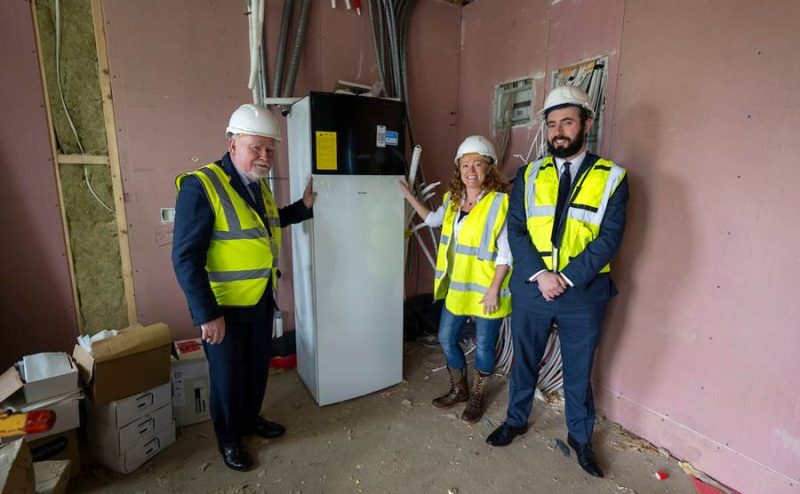
Residents in Galway City’s Westside area now have access to a ‘one-stop-shop’ to help them retrofit their homes, after the Northern and Western Regional Assembly (NWRA) and Galway City Council secured a €1m grant from the EU Net Zero Cities Programme.
A portion of the €1m funding from the Net Zero Cities programme will also be used to provide training courses in retrofitting for students, unemployed citizens, women and people with special needs in the region, with the aim of helping them to upskill and secure ‘green jobs’.
Using the funding, the NWRA, Galway City Council, University of Galway, the Atlantic Technological University, the Galway Energy Co-Operative and the Westside Resource Centre, are jointly developing strategies and services to reduce carbon emissions from home heating in the Westside area of Galway City.
The NWRA and Galway City Council applied to Net Zero Cities Programme with the aim of enhancing the level of retrofitting across the Westside, an area of Galway City which is classified as the Galway City Decarbonisation Zone, due to its above-average number of high-energy users and energy inefficient buildings, as well as its potential for increasing green spaces and improving air quality.
Amongst other key initiatives to tackle emissions in the Westside, the funding from the Net Zero Cities Programme will support the creation of a ’one-stop shop’ in the Westside of Galway City, to be named the “Warm Home Hub Westside”. The hub will provide advice to energy inefficient households on how to retrofit through information sessions and consultations with contractors and will be managed by the Galway Energy Co-Operative.
It is hoped that the hub will encourage 250 households to begin their retrofitting project, assisting them to reduce their energy bills and carbon emissions and heat their home some effectively.
In addition to the creation of the hub, the Net Zero Cities Programme will also support the following initiatives:
Through these initiatives, the Net Zero Cities programme will aim to support Galway City Council’s overall goal of reducing greenhouse gas emissions by 7% per annum in the Decarbonisation Zone from 2021 to 2030, leading to a 51% overall reduction in line with the targets set out in the Climate Action Plan 2023.
John Daly, Economist with the Northern and Western Regional Assembly, welcomed the €1m funding from the Net Zero Cities Programme, hailing it as a potential catalyst for change in Galway City and the wider North West region.
He said: “We’re delighted that the Net Zero Cities Programme has opted to help us kick-start our retrofitting ambitions in Galway City’s Decarbonisation Zone. The €1m funding will enable us to bring together leading experts and innovators to assess the challenges involved in retrofitting homes in the Westside of Galway City, develop and apply solutions, and share our learnings with our regional stakeholders.
“The Northern and Western Region of Ireland – which includes Galway City – is officially classified as a ‘Lagging Region’, one characterised by low productivity and a weak business environment. The region also performs poorly in terms of the number of homes with Building Energy Ratings between A and B2 in comparison to the national average. Indeed, many areas in the Northern and Western Region of Ireland are still reliant on oil and solid fuels as their primary source of heat, increasing their vulnerability in terms of health and exposure to energy price shocks. As such, the Net Zero Cities Programme can not only reduce people’s heating bills and carbon footprint in the region, but it also offers a potential roadmap for other parts of the Northern and Western Region of Ireland to develop similar types of programmes.
Speaking about the initiative, Mayor of Galway City, Cllr. Eddie Hoare, said: “As well as guiding households through their retrofitting journey, the Net Zero Cities team will be working with the construction industry to build capacity in the sector. This pilot project and the funding received through the EU Net Zero Cities Pilot Cities Programme provides Galway City with an excellent opportunity to test innovative approaches to reducing carbon emissions, in line with Galway City Council’s Climate Action Plan.”
Kieran Cunnane from Galway Energy Co-Operative said there were many advantages of retrofitting beyond cost savings, including improved health and comfort in warmer homes and a positive contribution to an important climate and environmentally friendly scheme.
He added: “The payback time for improving your home energy is often shorter than many people realise and also points to grants at the moment being quite generous. “The Warm Home Hub will help streamline the retrofitting process for Westside residents. The initiative guides them in understanding and accessing grants, finding suitable contractors, overcoming obstacles, and identifying financing options.”